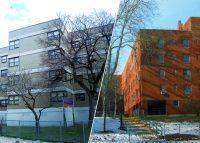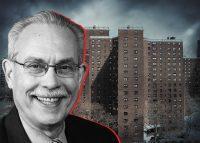A class-action lawsuit against the New York City Housing Authority accuses the beleaguered agency of creating “deplorable” living conditions for its more than 400,000 tenants across the five boroughs.
The suit, filed Wednesday by law firm Berg & Androphy, claims NYCHA residents are facing a litany of problems including lengthy gas shutdowns, mold, leaks, broken elevators and rodent and bug infestations. Their requests to have NYCHA fix these problems are generally answered slowly or not at all, according to the firm.
NYCHA — which has seen its share of public scrutiny and lawsuits over living conditions — in January said its estimated cost for repairs has ballooned to $40 billion. That’s up from $32 billion in 2018.
The latest lawsuit’s main argument is that these issues constitute violations of the contracts and laws that govern NYCHA housing, including the agency’s lease agreements with its residents.
“Although these developments were, when built, models of affordable public housing, NYCHA has failed in its responsibilities to tenants and allowed the NYCHA developments to fall into disrepair, rendering such housing unsanitary, dangerous and, at times, uninhabitable,” the complaint reads.
The lawsuit defines the class as everyone who lives in a NYCHA building or has lived in one within the past six years. It names three individual tenants as plaintiffs: Latisha McGriff, Ricardo Reed and Claresa Ward. McGriff and Ward live in the Red Hook West NYCHA development and Reed lives in Red Hook East.
Read more



McGriff has lived in Red Hook West for 11 years and has been dealing with a leaky roof and problems with her front door lock since 2017, according to the lawsuit. She has had a recurring problem with mice in her apartment as well. NYCHA was unable to quickly send an exterminator, so she went to stay with her sister for two weeks and ultimately paid for some of the fixes herself, the suit says. There are still mice in her home, according to the suit.
Problems at Reed’s apartment include a fuse box that has been broken since 2016 and a chronic leak behind his kitchen cabinets, according to the lawsuit. The suit also claims that NYCHA employees often fail to show up for scheduled repair appointments and that the elevators in his building “constantly reek of urine.”
“Ricardo has asked NYCHA to look at security camera footage to determine who was urinating in the elevators,” the suit reads, “but NYCHA informed him that the footage had not been retained.”
Ward has been dealing with problems such as multiple bathroom leaks, sparking electrical outlets and severe problems with roaches and mice that she has been unable to solve, according to the lawsuit.
“Since Claresa moved into her apartment, she has had problems with mice,” the suit reads. “Accordingly, she bought a cat, which kills three to five mice each day. However, there are so many mice that the cat is not enough to remedy the problem.”
The lawsuit seeks rent abatements and additional damages for the NYCHA tenants.
NYCHA deputy press secretary Rochel Leah Goldblatt said that the agency “will review the complaint when we receive it.”
The housing agency has been dealing with several major problems in recent years. It entered into a consent decree with the Department of Justice in 2018 in which it acknowledged responsibility for unsafe living conditions and making false statements about them to the public and federal inspectors.
In recent years, NYCHA has explored privatizing the management of its units. Most recently, it struck a $1.5 billion deal with five development teams including L+M Development Partners, Hudson Companies and Settlement Housing Fund to take over management of seven complexes with 5,908 units.
It has faced multiple recent class-action lawsuits as well over accusations ranging from lead paint inspections to widespread heat outages.
But Berg & Androphy partner Jenny Kim, who filed this week’s lawsuit, said it stood out from others because it centers on the agency’s violation of leases.
“We found that NYCHA has persistently and continuously breached the lease agreements,” she said. “These are contractual promises that were made to the tenants.”
The suit also takes a broader look at NYCHA issues than the agency is used to seeing, she said.
“Our lawsuit is all-encompassing,” Kim said. “We’re not just talking about the lack of heat and hot water. We’re not just talking about lead paint exposure. We’re talking about all of it. It’s everything that has caused our clients to live in indecent, unsanitary and unlivable homes.”
